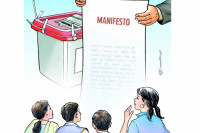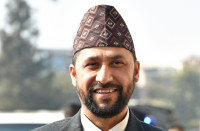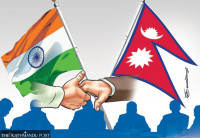National
Supreme Court annuls Rabi Lamichhane’s status as lawmaker
The Constitutional Bench concluded that the citizenship presented by Lamichhane to contest the election was invalid.
Post Report
The Supreme Court on Friday annulled Rabi Lamichhane’s status as a lawmaker citing that the citizenship certificate he produced to contest the parliamentary election was invalid.
A Constitutional Bench headed by Acting Chief Justice Hari Krishna Karki comprising Justices Bishowambhar Prasad Shrestha, Ishwar Khatiwada, Ananda Mohan Bhattarai and Anil Sinha issued the verdict.
“As Rabi Lamichhane has not completed the process for reacquiring his Nepali citizenship after renouncing his American citizenship, he cannot be a candidate for the position of a member of the House of Representatives or be elected to that position,” reads the verdict.
As the court invalidated his citizenship certificate, he can’t even be considered a Nepali citizen for now and it makes him ineligible to become a minister and party chief as well. Lamichhane was appointed Deputy Prime Minister and Home Minister on December 25.
The Rastriya Swatantra Party led by journalist-turned-politician Lamichhane had won 20 seats in the federal polls, making its fourth largest force in the parliament.
Lamichhane can reacquire a citizenship certificate by following a due process that requires filling out an application before District Administration Office.
On December 14, advocates Yubaraj Poudel and Rabiraj Basaula registered a writ petition at the Supreme Court arguing that Lamichhane cannot become a member of parliament because he doesn’t have Nepali citizenship.
The petitioners had demanded that Lamichhane should be removed from the post of party chief. The petitioner had said that only Nepali citizens have a constitutional right to vote in the elections, become candidates and open a political party in the country. The petitioners had contended that Lamichhane’s positions as a member of the lower house and party president were illegal.
The writ petitioners had also demanded that the Supreme Court issue an interim order to stop Lamichhane from working as a lawmaker until the final court verdict. During an initial hearing on the case, the apex court, on January 6 refused to issue an interim order concluding to decide the issue through a final verdict.
Section 10 of the Act says any Nepali citizen who voluntarily acquires citizenship of any foreign country will automatically lose Nepali citizenship.
Lamichhane, a media person by profession, returned to Nepal a few months after becoming an American citizen and started working here.
After four years, a complaint was lodged in the Press Council Nepal saying that he was working in Nepal without a work permit. A foreign national needs a permit to work in Nepal. Only after the criticism did Lamichhane in May 2018 abandon their American citizenship and its proof was presented to the Department of Immigration.
He, however, never applied to reclaim his citizenship. Lamichhane’s lawyers had argued that as he never renounced Nepali citizenship, his citizenship from 1994 got automatically revived the day he surrendered American Citizenship.
The Citizenship Act, however, doesn’t say so. Section 11 of the Citizenship Act says if any citizen of Nepal who has acquired foreign citizenship returns to reside in Nepal and submits a notification to the designated authority the evidence of renunciation of foreign citizenship, his/her Nepali citizenship shall be provided again once s/he submits the evidence of renunciation.
An application needs to be submitted to the respective office to reclaim Nepali citizenship as per the Act and its regulation.
Clause 11 of the regulation to the Act says the person who has renounced foreign citizenship should apply to the Ministry of Home Affairs or the concerned District Administration Office. The concerned authority, after studying the application, would issue the citizenship of Nepal containing the same details mentioned in the previous document. The copy of the citizenship he had produced to file the nomination was issued in 1994.




 11.12°C Kathmandu
11.12°C Kathmandu














